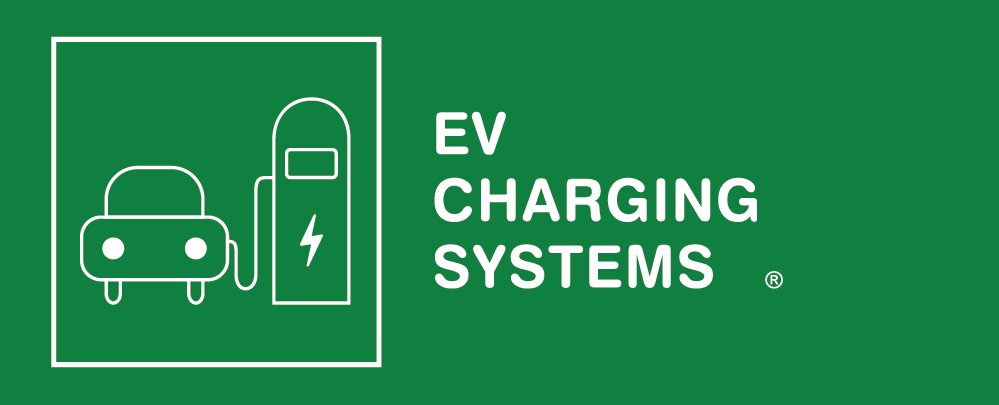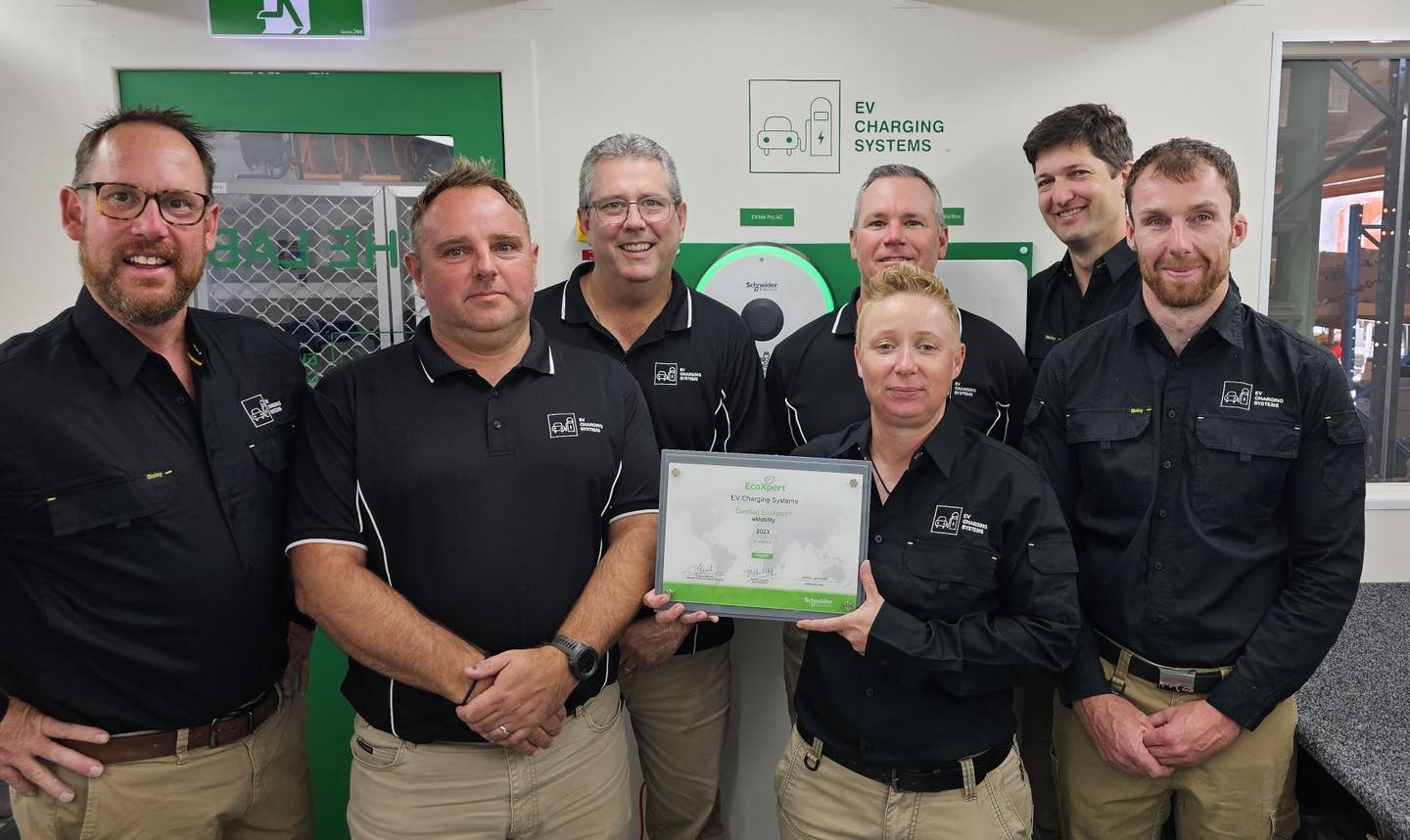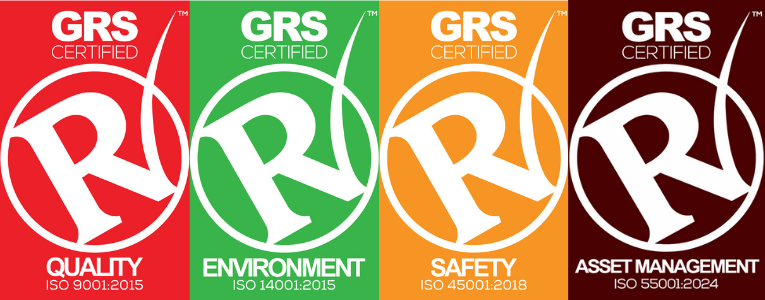EV charger installation requirements in Australia are important for a safe, efficient charging station. With the growing interest in electric vehicles, we’ve been getting a lot of questions about rules and regulations for EV charger installation.
Whether you are looking at State or Government EV charger installation, commercial EV charger installation, or residential EV charging stations, here are the key requirements you need to know.
Key Requirements for EV Charger Installation in Australia
The Australian and New Zealand Wiring Rules, AS/NZS 3000:2018 outline EV charger installation requirements in Australia.
These mandatory requirements specify that EV charger installation in Australia must:
- Be completed by a licensed, fully-qualified electrician
- Include a dedicated circuit for each EV charger unit
- Have no other appliances wired to the same circuit as the EV charger unit
- Be connected to mains power (hard-wired)
- Include an individual overcurrent protective device (circuit breaker) for each charger unit (circuit breaker)
- Be fitted with RCD protection (Residual Current Device)
- Be a minimum of 800mm from the ground (minimum height)
- Be installed with a correctly sized cable for the required load
- Have all electrical cable sizing fall under Australian Standard, AS/NZS 3008.1.1:2017
Specific Requirements and Compliances for EV Chargers
Power Supply and EV Charger Installation Requirements Australia
Because EV chargers are a hard-wired appliance, they draw energy directly from the switchboard. This places an additional load on your electrical system. Drawing energy from the mains power involves a careful assessment of your current electrical infrastructure to determine if upgrades are needed.
EV charger installation requires a licensed electrician to ensure your existing electrical infrastructure is safe and capable of handling the increased electrical demands.
Each EV charging station is required by Australia law to have a dedicated circuit without any other appliances wired to it, a circuit breaker for each charging unit, and RCD protection.
Overcurrent Protection and EV Charger Installation Requirements Australia
Circuit breakers protect against electrical overload by automatically breaking the circuit if too much electricity is drawn through the cable.
This important measure protects against safety hazards such as cable damage and overheating. A licensed electrician will ensure the overcurrent protective device for your EV charging station is in compliance with AS/NZS 61009, AS/NZS 60898, or AS/NZS 60947.
Cable Sizing and EV Charger Installation Requirements Australia
EV charger brands offer varying cable length, usually from 3 to 10 metres. Cable length will determine your parking options and the way you park, making it an important consideration when installing an EV charging station.
Cable sizing also mattress for safety purposes. For instance, an undersized cable may overheat and turn into an electrical hazard.
Cable sizing from the power supply to the EV charger must be installed in accordance with AS/NZS 3008.1.1:2017.
A licensed electrician will ensure compliance with Australian cable sizing regulations, which will cover factors such as:
- The distance the cable has to be run to support the EV charger
- The current the cable must be able to handle
- The diameter of the cable and how heavy it is
- The installation environment and temperature
When we perform site assessments, we evaluate all aspects of the setup, including user preferences, layout, and current electrical infrastructure to tailor an EV charging station to your exact needs.
Safety and Protection Requirements for EV Charger Installation Requirements Australia
RCDs (Residual Current Devices) are one of the most important safety mechanisms in the electrical world.
RCDs, also known as safety switches, work by instantaneously breaking the circuit if it is unbalanced. This protects against electrical shock or electrical fires. Along with protecting you and your family against electrical hazards, RCDs also protect your EV and electrical infrastructure against damage.
Because of their immense importance and effectiveness, RCD’s are required for all domestic wiring in Australia. This includes EV charger installation.
When we install EV charging stations, we evaluate the RCD your installation will require to ensure safety and compliance.
Wiring and EV Charger Installation Requirements Australia
Since EV chargers are hard-wired, Australian law requires installation by a licensed electrician. Licensed electricians must complete the installation in compliance with Australian Standard AS/NZS 3000 and the Electricity Safety Act 1998.
To ensure the safety, efficiency, and compliance of EV charger installation, other important considerations include:
- Cable Reach – Will the cable reach the charging point without the need for tugging or stretching it?
- Space – Is there enough space surrounding the charger to easily move around it and avoid tripping over cables?
- Ease of Accessibility – Is the location easily accessible and away from other traffic, and not obstructing anything?
- Weatherproof – Does it need weatherproofing? Outdoor installations require outdoor-rated charging units.
- Protection – Is the charging station safe from potential falling objects or obstructions?
- Minimum Height — Will the charger be installed at least 800mm off the ground in accordance with Australian requirements?
Solar Integration and EV Charger Installation Requirements Australia
If your EV charger installation will include solar integration, you’ll need to be aware of additional requirements and qualifications in Australia.
Solar integration will require compliance with the Australian Standard AS/NZS 5139 Electrical Installations – Safety of Battery Systems for use in Inverter Energy Systems.
You can learn more about solar integration with EV charging stations in our guide here: Charging EV With Solar: Our Guide to EV Solar Charging.
EV Charging Equipment Requirements
The actual EV charger unit must comply with:
- Electrical Equipment Safety System (EESS) — The EESS helps ensure consumer safety by requiring various test reports and safety certificates from electrical suppliers.
- Australian Standard AS/NZS 3820 — AS/NZS 2820 is the general electric safety standard in Australia. Any electrical equipment is required to comply with this standard and be proven safe in order to be sold in or imported to Australia.
Requirements for Ongoing Testing/Maintenance of EV Chargers
Our service doesn’t end after your EV charging station installation is complete. Along with our turnkey EV charging system solutions, we offer on-call support, testing services, and preventative maintenance.
Our preventative maintenance packages ensure your EV charging system operates safely, efficiently, and in accordance with Australia’s ongoing maintenance requirements.
Regulatory Bodies and Key Standards to Know for EV Chargers
Several organisations and government bodies collaborate to implement and regulate standards that promote sustainable, efficient, and safe EV charging throughout Australia.
Here are some of the main regulatory bodies for EV charger installation in Australia:
- Australian Standards (AS) Committees — The Australian Standards committees, such as AS/NZS 3000:2018 and AS/NZS 3008, develop safety and electrical standards for EV charger installations.
- Clean Energy Council (CEC) — The Clean Energy Council ensures EV chargers meet specific performance, safety, and quality standards.
- Electric Vehicle Council (EVC) — The EVC provides recommendations regarding EV charger installation regulation. The Electric Vehicle Council also supports EV charging infrastructure by advocating for EV-friendly initiatives and policies.
- Energy Networks Australia (ENA) — ENA helps develop guidelines and technical standards regarding EV charger installations. They aim to seamlessly integrate EV charging stations with the grid to optimise efficiency and minimise disruptions.
- Local Councils and Planning Authorities — It is important to research requirements set by your local councils and planning authorities as these will vary based on your location. Local authorities and councils outline land use planning, required permits, and zoning regulations regarding the installation of EV charging stations.
- State and Territory Regulators — Local EV regulations and permitting requirements vary across Australia’s different states and territories. Each territory and state has its own regulations regarding EV charger installations, such as environmental requirements, infrastructure requirements, and safety standards.
Do I Need an Electrician to Install an EV Charger in Australia?
Yes, you are legally required to have a licensed, qualified electrician handle EV charger installation in Australia. EV charging stations require extensive electrical knowledge, the ability to evaluate electrical infrastructure, and wiring expertise.
Turnkey EV Charger Installation
Complying with all requirements for EV charger installation in Australia is crucial for legal and safety reasons.
With a thorough understanding of all state and local regulations for EV charger installation, EV Charging Stations is your trusted local solution for all aspects of EV charging stations.
We offer compliant turnkey EV charger installation, including:
- State and Local Government EV charger installation
- Commercial EV Charger Installation
- Residential EV Charger Installation
- Fleet EV Charger Installation
Contact us to learn more about our EV charger supply, installation, maintenance, load management, and repair services in Perth or for your quote.








